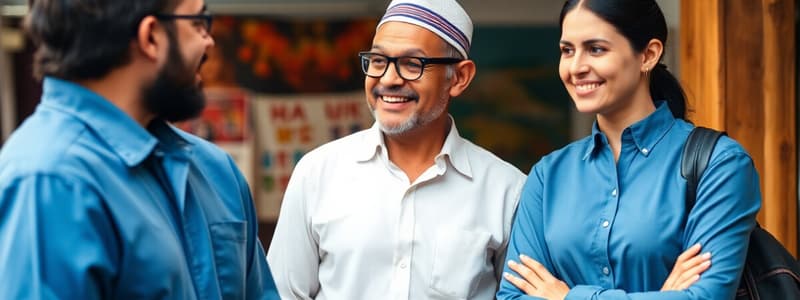Podcast
Questions and Answers
What is the primary purpose of the Pomodoro Technique?
What is the primary purpose of the Pomodoro Technique?
- To enhance creativity through brainstorming sessions
- To maximize productivity and prevent burnout through focused intervals (correct)
- To improve time management during long projects
- To reduce the need for breaks during work
Which of the following is NOT a cause of procrastination?
Which of the following is NOT a cause of procrastination?
- Setting unrealistic goals (correct)
- Lack of motivation
- Unclear priorities
- Perfectionism
What is an example of a key skill needed in negotiations?
What is an example of a key skill needed in negotiations?
- Strong technical skills in the subject matter
- Determined insistence on one's own viewpoint
- Active listening and empathy (correct)
- Ability to memorize all details of a contract
Which communication style is least likely to resolve conflicts effectively?
Which communication style is least likely to resolve conflicts effectively?
For a visual learner, which of the following methods would be most effective?
For a visual learner, which of the following methods would be most effective?
What is the main advantage of using a transformational leadership style in tourism?
What is the main advantage of using a transformational leadership style in tourism?
Which of the following best describes efficiency in the context of tourism?
Which of the following best describes efficiency in the context of tourism?
What is a characteristic of soft skills in tourism professionals?
What is a characteristic of soft skills in tourism professionals?
What does the 'S' in SMART goals stand for?
What does the 'S' in SMART goals stand for?
What is the primary purpose of effective teamwork in the tourism sector?
What is the primary purpose of effective teamwork in the tourism sector?
Which of the following is considered a 'time thief'?
Which of the following is considered a 'time thief'?
Why is adaptability important for tourism professionals?
Why is adaptability important for tourism professionals?
What is the main focus of transformational leadership?
What is the main focus of transformational leadership?
Flashcards
Democratic Leadership
Democratic Leadership
Involves team members in decision-making, promoting creativity and collaboration, but may slow down decision-making in urgent situations.
Transformational Leadership
Transformational Leadership
Focuses on inspiring and motivating change, ideal for innovative projects, but may require strong communication skills.
Effectiveness (Tourism)
Effectiveness (Tourism)
Achieving desired outcomes and fulfilling goals, such as satisfying customer needs. In tourism, it means creating memorable guest experiences.
Efficiency (Tourism)
Efficiency (Tourism)
Signup and view all the flashcards
Elevator Pitch
Elevator Pitch
Signup and view all the flashcards
Time Thieves
Time Thieves
Signup and view all the flashcards
SMART Goals
SMART Goals
Signup and view all the flashcards
Teamwork (Tourism)
Teamwork (Tourism)
Signup and view all the flashcards
Pomodoro Technique
Pomodoro Technique
Signup and view all the flashcards
Procrastination
Procrastination
Signup and view all the flashcards
Negotiations
Negotiations
Signup and view all the flashcards
Types of Learners
Types of Learners
Signup and view all the flashcards
Communication in Tourism
Communication in Tourism
Signup and view all the flashcards
Study Notes
Leadership Styles in Tourism
- Autocratic: Centralized decision-making, works well in crises but may hinder creativity.
- Democratic: Involves team input, promotes creativity and team satisfaction.
- Transformational: Focuses on inspiring changes, ideal for innovation.
- Transactional: Rewards and punishments used, effective for task-oriented projects.
- Laissez-faire: Minimal supervision, suitable for highly skilled teams.
Effectiveness vs. Efficiency
- Effectiveness: Achieving goals (e.g., satisfying customer needs, fulfilling objectives).
- Efficiency: Achieving goals with minimal resources (time, money, effort).
- Tourism Application: Both crucial: creating memorable experiences while managing costs.
Essential Skills for Tourism Professionals
Soft Skills
- Communication: Essential for interactions.
- Adaptability: Adjusting to changing situations.
- Teamwork: Collaboration and contribution to a group effort.
- Emotional intelligence: Understanding personal and others' emotions.
- Problem-solving: Addressing issues and finding solutions.
Hard Skills
- Language proficiency: Crucial for interactions with tourists.
- Booking systems knowledge: Managing reservations & operations.
- Itinerary planning: Structuring trips and travel arrangements.
- Data analysis: Interpreting data to make informed decisions.
SMART Goals
- Specific: Clear, concise statements (e.g., "Increase bookings by 20%").
- Measurable: Quantifiable, trackable (e.g., monthly booking reports).
- Achievable: Realistic, considering target markets.
- Relevant: Aligned with business objectives (e.g., seasonal campaigns).
- Time-bound: Clear, defined deadlines (e.g., end of Q2).
Teamwork, Networking, Time Management
- Teamwork: Collaborating, defining roles, using diverse expertise.
- Networking: Building relationships with stakeholders (hotels, agencies, guides).
- Time Management: Prioritizing tasks, using tools (calendars, apps).
Professional Characteristics
- Passion & Cultural Sensitivity: Crucial for delivering service.
- Problem-solving & Quick Decision-Making: Under pressure, handling issues.
- Creativity & Adaptability: Responding to changing conditions.
Other Important Concepts
- Acosta Law: Likely a time management principle, allocating based on urgency and importance.
- Elevator Pitch: Concise, compelling statement about oneself or business (~30 seconds).
- Time Thieves: Activities that waste time (e.g., excessive social media).
- Pomodoro Technique: 25-minute focus intervals with 5-minute breaks.
- Procrastination: Causes (lack of motivation, perfectionism, unclear priorities), solutions (breaking tasks down, deadlines, accountability partners).
- Negotiations: Key skills (active listening, empathy, communication, compromise), tourism applications (supplier agreements, customer complaints, pricing).
- Negotiation Phases/Styles: Planning, execution, monitoring, feedback; styles (assertive, passive, aggressive, collaborative).
- Learning Styles: Visual, auditory, kinesthetic, reading/writing.
Studying That Suits You
Use AI to generate personalized quizzes and flashcards to suit your learning preferences.




